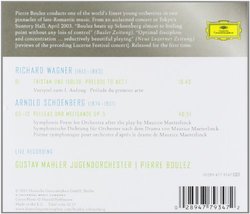| All Artists: Arnold Schoenberg, Richard Wagner, Pierre Boulez, Gustav Mahler Jugendorchester Title: Schoenberg: Pelleas & Melisande Members Wishing: 1 Total Copies: 0 Label: Deutsch Grammophon Release Date: 3/6/2012 Genres: Pop, Rock, Classical Style: Symphonies Number of Discs: 1 SwapaCD Credits: 1 UPC: 028947793472 |
Search - Arnold Schoenberg, Richard Wagner, Pierre Boulez :: Schoenberg: Pelleas & Melisande
 | Arnold Schoenberg, Richard Wagner, Pierre Boulez Schoenberg: Pelleas & Melisande Genres: Pop, Rock, Classical
"Yearning, yearning, insatiable longing ever reborn, thirsting and repining! The only release is to die, to perish, to fade away, nevermore to awaken!" This is how Wagner himself summed up the plot of his opera Tristan und... more » |
Larger Image |
CD Details
Synopsis
Product Description
"Yearning, yearning, insatiable longing ever reborn, thirsting and repining! The only release is to die, to perish, to fade away, nevermore to awaken!" This is how Wagner himself summed up the plot of his opera Tristan und Isolde in the most succinct imaginable manner. But, strictly speaking, it is impossible to call it an "opera", for in writing the work Wagner had explored what he called "the profound art of resonant silence", investigating the darker side of the human psyche and setting foot in an alternative world inaccessible to language, a theatre of the mind lacking in any sense of theatrical spectacle. Here music reasserts its primal rights, as Wagner went on to explain in his note on the Prelude to Act I: "The musician who chose this theme to introduce his love drama was bound to feel entirely at one with that most absolute and unrestricted element that is music, so that his sole concern was how he might best restrict himself, inasmuch as the theme he had chosen could never be wholly exhausted." In the event, Wagner failed miserably to reveal himself as a master of self-restraint when he composed this prelude, an introduction which commentators, endowed with the keenness of hindsight, have claimed marks the birth of musical modernism. Pierre Boulez prefers a less vague definition and speaks of the "beginning of the chromatic era of our age". Wagner's successors - and here Boulez thinks in particular of Mahler and Schoenberg - took this development a stage further, resulting in "total chromaticization as a result of the need for Expressionist expression - tonal relationships were abandoned in favour of the explosive force of a chromaticism that allowed composers to move quickly towards a style described as `atonal'." Not only musicians in Vienna but literary figures in Paris fell under the spell of Wagner, whose music dramas proved a source of tremendous and inescapable provocation for the whole of western civilization. His medieval subject matter, the pseudo-archaic tone of his librettos and the synaesthetic undertow of works notable for their use of tone colour were all a challenge to writers in a field they had regarded as their own exclusive preserve. It was at the end of the 19th century, when wagnérisme enticed French thinking out of the midday light of reason and into the semi-darkness of myth and music, that the Flemish playwright Maurice Maeterlinck, who was born in Ghent in 1862, wrote his dreamlike plays, plays best described not so much as works of literature than as expressions of "resonant silence". His play Pelléas et Mélisande was first performed in Paris in 1893 and is set in legendary times in the distant kingdom of Allemonde. On an overgrown path in a gloomy forest one of the king's grandsons, Golaud, discovers Mélisande weeping alone at the edge of a well as if she had just emerged from its depths like the Ondine of the fairy tale. Golaud takes the unknown woman back with him to his castle as his wife, and it is here that she meets his half-brother, Pelléas. The castle is built on gloomy grottoes over underground lakes and is surrounded by impenetrable forests, without light and life, joyless and desolate. For all its furtive intensity, the tragedy that unfolds as a result of Golaud's jealousy of the burgeoning love between Pelléas and Mélisande is treated by Maeterlinck in a supremely understated manner lacking in action and theatricality and remote from any conventional dramaturgy and from the usual logic of the theatre. As such, the play seems made for the taciturn art of music. Debussy's somnambulistic and almost reverential setting of Maeterlinck's play was staged at the Opéra-Comique in Paris in 1902, the same year as that in which Schoenberg decided to set this anti-drama to music, not, however, as an opera but as a symphonic poem. "It is hard to resist the idea of comparing the two scores," writes Pierre Boulez. "We may content ourselves with observing that Debussy's aesthetic approach was far more novel than the Romantic emotionalism in which Schoenberg was still immersed at this time; it would take a number of years for him to break free from this post-Wagnerian world of ideas." There is no doubt that Debussy's opera comes far closer to Maeterlinck's mysterious and elusive poem than Schoenberg's orchestral work, which he completed in February 1903, the exuberant polyphonic writing of which struck contemporaries as opaque and above all unplayable. Even Mahler found the score "enormously complex". Schoenberg's Pelleas und Melisande is a music drama without words, a detailed tone poem with themes "in the nature of Wagnerian leitmotifs", a work, finally, whose formal design may be interpreted either as an example of first-movement sonata form on an altogether gigantic scale or as a four-movement symphony. At the time he wrote it, Schoenberg was still struggling to find recognition as a composer and lavished a profligate degree of mastery on the score. The ideal of restraint and self-restraint occurred to him only later when he began to arrange his twelve notes in serial rows and opened up a new chapter in the "chromatic era", an era of which Wagner's Tristan und Isolde was itself no more than a prelude. Wolfgang Stähr
Similarly Requested CDs
| Donny Osmond Soundtrack of My Life Genres: Pop, Rock, Soundtracks Label: Verve | |
| Giovanni Gracefully Genres: International Music, New Age, Pop, Broadway & Vocalists, Latin Music Label: Goodbye Better | |
| Warren Barfield Worth Fighting for Genres: Pop, Christian & Gospel Label: Essential | |

 Track Listings (12) - Disc #1
Track Listings (12) - Disc #1



